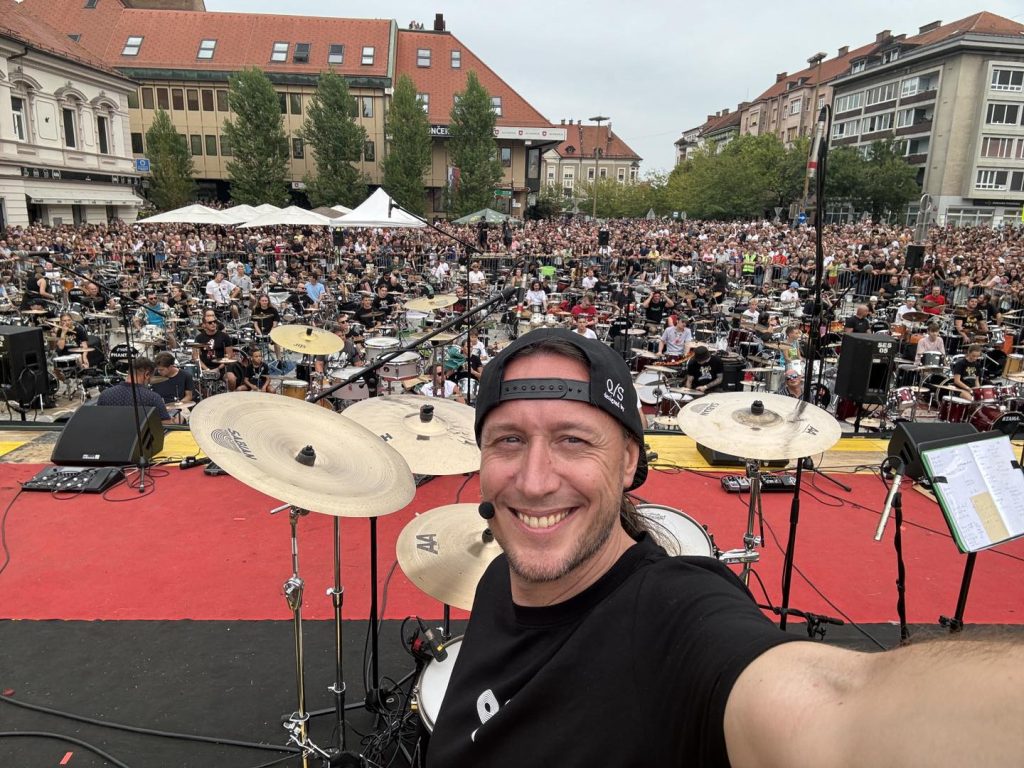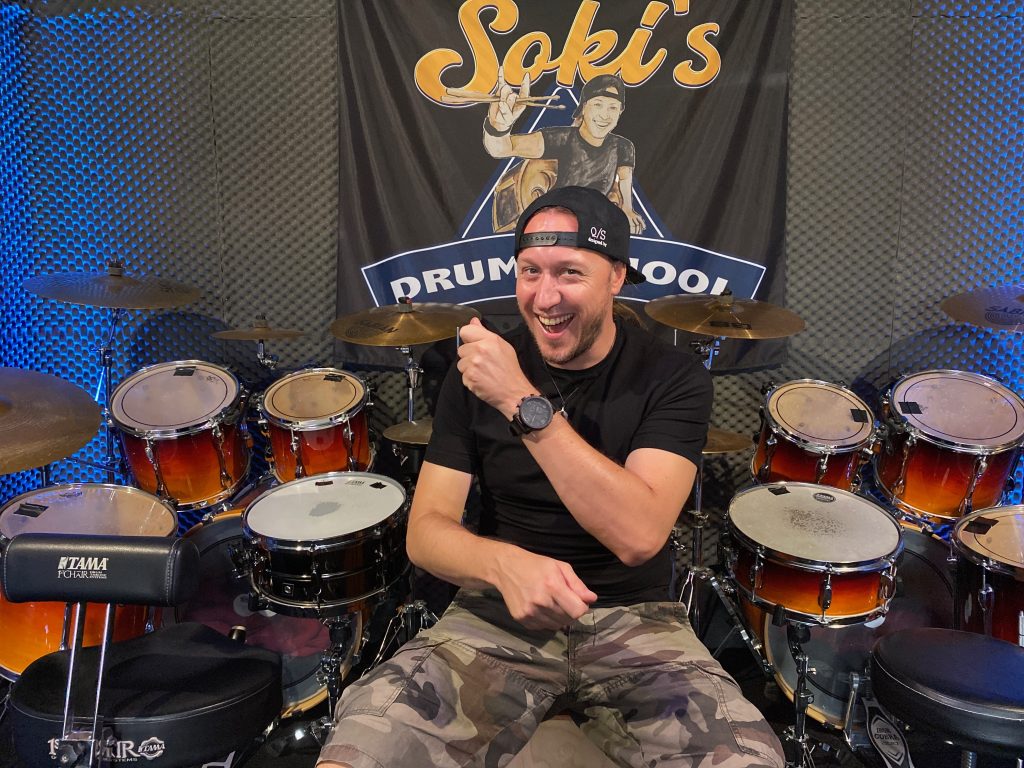Blog
From “Terminator” to Drumming Virtuoso

We spoke with Marko Soršak – Soki – drummer for the band Elvis Jackson, drumming instructor, drumming promoter, and passionate music mentor (not necessarily in that order). He shared with us his story, full of rhythm, a touch of metal, passion, and continuous exploration.
It all started with… Terminator?
“I remember, it was November 1999. On a cultural day at primary school, we went to see Terminator 2. Before the movie started, they played ‘You Could Be Mine’ by Guns N’ Roses… and the first five seconds of that drum intro literally ‘blew my mind‘! From that day on, there was no turning back. Everything focused on drumming: on growth, learning, engagement, concerts, first bands. At 13, I stepped on stage for the first time, and it was already in a metal band. That’s when life truly began. Thanks, Arnold Schwarzenegger!” (laughs)
Has metal always been your main focus?
Look, at heart, I’m truly a metalhead. On the other hand, I feel even more like a fan of 80s music. Guns N’ Roses made me a rocker. But the Guns weren’t in the forefront for long. Soon after, I saw the music video for “Enter Sandman” by Metallica, and that was a completely different extreme. That’s when I delved deep into metal, real heavy metal. The more they “growled,” the more I enjoyed it. Then I started to grow with the music. Back then, my idols were the drummers of those bands. Later, I wanted to develop and learn new things. So I started exploring other musical styles and people who led me into different spheres. If I draw a line through this “strange stew,” everything built upon itself and led me to where I am today. I’m not just talking about drumming; I’m talking about life.
You’re also a music teacher and work a lot with young people. What do you pay attention to when a new student comes to your school? What are you looking for?
I started teaching when I was seventeen. At that time, I primarily wanted to share what I had learned and knew. It was a kind of “copy-paste” forward, and I felt I was good enough to pass it on. On the other hand, it was important for me to earn something and be independent from my mom.
Today, it’s different. When a student comes, I “scan them like the Terminator.” (laughs). I want to get to know them as a person, as an individual; I try to psychologically assess how I’m going to start working with them. It’s not just about giving them a book and telling them to do the first exercise, then the second. First, there needs to be immense communication. I really enjoy talking. Right from the start, you form a certain picture, and based on that, I begin to develop the story. I can’t start working with everyone in the same way, as each individual has their own individuality and a different way of learning. What is common to all is what no one who comes can skip. It’s like saying you can’t speak Slovenian if you don’t know the alphabet. Even here, you characteristically adapt your approach to imparting knowledge. And that’s precisely the greatest charm and joy for me in working with young people. That’s why, after more than 28 years, I still don’t get tired of it.
Is your style or the “Soki school” recognizable in your students?
I would say that some truly embody your authentic energy and are genuinely close to a “copy-paste” method. Then there are enthusiasts who adopt your words and instructions and see you as a role model to a certain extent. And then there are others with whom you just don’t get as close.
Tell me, is drumming more about talent or primarily about a lot of hard work and practice?
Absolutely, a lot of hard work and practice. Talent is a double-edged sword. It can lift you to great heights, but it can also blind you. This means you start believing in your talent even before you’ve accomplished anything. Ego and false expectations take over.
However, I observe that young people have the will. That’s why, when they start doing well, I insist that they “grind” and practice. After three years, I’m almost “hunting” some of them myself. Of course, in such cases, it’s about hidden talents, and encouragement and perseverance are necessary to help them achieve even more.
Do you recognize talent? How quickly?
From a kilometer away, yes! (laughs) Let me elaborate. You can’t recognize talent at first glance. Talent always comes later. You recognize the approach, and talent is merely an aid in acquiring and upgrading knowledge. The question is whether talent overcomes you or not. If ego or talent takes over, they will lead you forward, not you. That’s why I say that those who are less talented have to work harder and fight more, which is why they “get through” better. Because they truly have to make every step hard, and they are more prepared for life. I can’t tell you this any better.
Are you organizing a drumming gathering this year, like the one in Maribor last year?
Unfortunately, no. I’ve organized four such events, but now time and finances no longer allow it. It’s three, four months of sleepless nights and extra stress. Every day you’re in contact with a hundred to two hundred drummers, and something is always happening. Plus, I’m the sole organizer. And there’s no money. So, unfortunately, no. I’m directing my energy towards other projects to promote drumming.
How important do you think it is to have a domestic manufacturer?
Very. It’s important to me to support every domestic manufacturer producing a good, quality product. I am proud of everyone who creates a good product at home.
What should be the role of a domestic manufacturer?
The manufacturer should highlight their product, which they are proud of and stand behind. It’s important to be constantly present, to be a connector, and to communicate within the local environment, collaborating with others and even competitors. In any case, I support anyone who also goes out into the world.
Like the annual gatherings (last year in Mozirje)?
Yes, that’s exactly what I mean. If we’re talking about this, and we went back 18 years, drumming clinics, workshops, and similar events were very common and well-attended. Now it’s rare. And Mozirje has proven that now is the right time for such events to be revived again. Of course, to a manageable extent. I support this and happily participate. And for Nejc (BONE), this should be a kind of obligation to organize us again. Yes, that should also be the role of a domestic manufacturer.
At BONE, we’ve focused on making drums from carbon fiber. What do you think about such materials?
Look, the way BONE thinks is often “out of the box.” I think that has characterized this company from the beginning. The first catalog I got almost 20 years ago looked like I was in the middle of California in some serious “custom-made” shop. Very high-level, with photos, pictures with the Ramones… And I thought, “what the fuck,” this is the first time I’ve heard of these drums, and someone from Slovenia is making them, right?! That was a triumph. Then he disappeared for a while. But apparently, he started looking for new things he’s working on today. So, new products, new materials, like carbon.
I believe Nejc knows what he’s doing and why he’s doing it, thus creating his own story. I’m confident that he will also produce the product he’s envisioned. So I absolutely give a plus of support to his work, and I am definitely willing to try what he’s creating myself. I’m also interested in novelties. Whether it will develop further is a matter of taste. Even if the product is the best in the world, it cannot suit everyone. For some, it will be excellent, for others, quite the opposite.

What materials do you personally use the most?
Mostly wood and metal. Honestly, when I was younger, I was interested in every detail: material, plies, snare wires… The basic foundation is now important to me; “maple” is fine for me, and I like how it “plays for me.” Carbon could also be an option if we find each other.
How many drum kits do you own?
I have 18 kits and 20 to 25 snare drums. It’s quite a collection and represents a significant value. My favorite is a kit like Lars Ulrich’s. It’s not a copy; it’s a kit like the one he plays. That’s the policy of the brand I play.
What about electronic drums? What’s a classical drummer’s take on them?
I think every classical drummer should also have electronic drums. But only when you already know how to play or are already immersed in the world of acoustic drums. That’s when electronic drums serve you well. Never the other way around. If you start on electronics or prioritize them, then no.
Is that also your advice to your students?
In this case, you need to consider several things. Primarily, money and the space available to you. You simply can’t practice acoustic drums in apartment buildings. So then you combine, and at our school, we always make sure they always have the opportunity to play and practice on acoustic/classical drums. So, we always start with acoustic drums, but electronic drums also come into play for additional practice. They are definitely secondary.
Anything else for the end, Soki?
We need to connect and learn from one another so that everyone benefits as musicians and as a nation. I believe that’s the only way we can grow and remain competitive. You know, sometimes I feel like the real issue is us because we tend to be perfectionists in the wrong areas. Even though we have solid know-how and the potential to establish ourselves globally with our knowledge. And not just individuals.
LINKS: Facebook, Instagram, Elvis Jackson band


